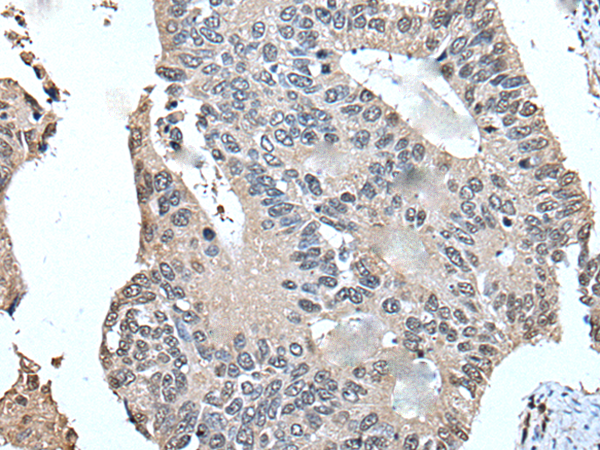
| WB | 咨询技术 | Human,Mouse,Rat |
| IF | 咨询技术 | Human,Mouse,Rat |
| IHC | 1/30-1/150 | Human,Mouse,Rat |
| ICC | 技术咨询 | Human,Mouse,Rat |
| FCM | 咨询技术 | Human,Mouse,Rat |
| Elisa | 1/5000-1/10000 | Human,Mouse,Rat |
| Aliases | BM-002; C13orf20 |
| Host/Isotype | Rabbit IgG |
| Antibody Type | Primary antibody |
| Storage | Store at 4°C short term. Aliquot and store at -20°C long term. Avoid freeze/thaw cycles. |
| Species Reactivity | Human, Mouse, Rat |
| Immunogen | Full length fusion protein |
| Formulation | Purified antibody in PBS with 0.05% sodium azide and 50% glycerol. |
+ +
以下是关于UFM1抗体的3篇代表性文献及其摘要概括:
1. **文献名称**:*UFM1 E3 ligase promotes recycling of 60S ribosomal subunits from the ER*
**作者**:Wang F. et al. (2023)
**摘要**:该研究利用UFM1特异性抗体,揭示了UFMylation修饰系统在内质网应激下核糖体回收中的作用,证明UFM1抗体可有效检测内质网相关UFM1-核糖体复合物的动态变化。
2. **文献名称**:*Aberrant UFMylation in ALS/FTD neurons impairs DNA repair*
**作者**:Izumi R. et al. (2021)
**摘要**:通过免疫共沉淀(使用UFM1抗体)和质谱分析,发现肌萎缩侧索硬化症(ALS)患者神经元中UFM1修饰异常,导致DNA修复功能缺陷,揭示了UFM1抗体在神经退行性疾病机制研究中的应用价值。
3. **文献名称**:*UFM1-Specific Ligase Recognition in the UFMylation Cascade*
**作者**:Komatsu M. et al. (2019)
**摘要**:该研究开发了高特异性UFM1抗体,系统解析了UFM1与E3连接酶UFL1的相互作用机制,为UFMylation通路的功能研究提供了关键实验工具。
---
**提示**:UFM1抗体相关研究多聚焦于其参与的蛋白质翻译后修饰(UFMylation)在癌症、神经疾病及内质网应激中的调控机制。建议结合具体研究方向(如疾病模型、互作蛋白筛选)进一步筛选文献。
The UFM1 (Ubiquitin-fold modifier 1) antibody is a crucial tool for studying the UFMylation pathway, a post-translational modification system involved in maintaining cellular homeostasis. UFM1. a ubiquitin-like protein (UBL), covalently attaches to target proteins via a cascade involving E1 (UBA5), E2 (UFC1), and E3 (UFL1) ligases. This process, termed UFMylation, regulates critical biological processes, including endoplasmic reticulum (ER) stress response, ribosome-associated quality control, and DNA repair. Dysregulation of UFM1 signaling has been linked to developmental disorders, neurodegenerative diseases, and cancers.
UFM1 antibodies are widely used to detect UFM1-conjugated proteins or free UFM1 in techniques like immunoblotting, immunofluorescence, and immunoprecipitation. Specific antibodies distinguish between unconjugated UFM1 (pro-UFM1) and its activated/processed forms, aiding in pathway activation studies. Research highlights UFM1's role in erythroid development, neuronal health, and tumor suppression, with knockout models showing embryonic lethality or tissue-specific defects. Recent studies also implicate UFMylation in autophagy-lysosome function and immune regulation, expanding its therapeutic relevance. Commercial UFM1 antibodies are typically raised against full-length or epitope-tagged human UFM1. validated for cross-reactivity in model organisms like mice and zebrafish.
×